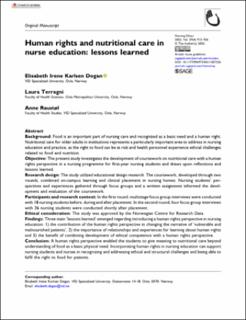| dc.contributor.author | Terragni, Laura | |
| dc.contributor.author | Raustøl, Anne | |
| dc.date.accessioned | 2022-09-14T09:23:49Z | |
| dc.date.available | 2022-09-14T09:23:49Z | |
| dc.date.created | 2022-03-23T11:02:34Z | |
| dc.date.issued | 2022-02-07 | |
| dc.identifier.issn | 0969-7330 | |
| dc.identifier.issn | 1477-0989 | |
| dc.identifier.uri | https://hdl.handle.net/11250/3017754 | |
| dc.description.abstract | Background: Food is an important part of nursing care and recognized as a basic need and a human right. Nutritional care for older adults in institutions represents a particularly important area to address in nursing education and practice, as the right to food can be at risk and health personnel experience ethical challenges related to food and nutrition.
Objective: The present study investigates the development of coursework on nutritional care with a human rights perspective in a nursing programme for first-year nursing students and draws upon reflections and lessons learned.
Research design: The study utilized educational design research. The coursework, developed through two rounds, combined on-campus learning and clinical placement in nursing homes. Nursing studentsʼ perspectives and experiences gathered through focus groups and a written assignment informed the development and evaluation of the coursework.
Participants and research context: In the first round, multistage focus group interviews were conducted with 18 nursing students before, during and after placement. In the second round, four focus group interviews with 26 nursing students were conducted shortly after placement.
Ethical consideration: The study was approved by the Norwegian Centre for Research Data.
Findings: Three main ʽlessons learnedʼ emerged regarding introducing a human rights perspective in nursing education: 1) the contribution of the human rights perspective in changing the narrative of ʽvulnerable and malnourished patientsʼ, 2) the importance of relationships and experiences for learning about human rights and 3) the benefit of combining development of ethical competence with a human rights perspective.
Conclusion: A human rights perspective enabled the students to give meaning to nutritional care beyond understanding of food as a basic physical need. Incorporating human rights in nursing education can support nursing students and nurses in recognizing and addressing ethical and structural challenges and being able to fulfil the right to food for patients. | en_US |
| dc.language.iso | eng | en_US |
| dc.publisher | SAGE Publications | en_US |
| dc.relation.ispartofseries | Nursing Ethics;Volume 29, Issue 4 | |
| dc.rights | Navngivelse 4.0 Internasjonal | * |
| dc.rights.uri | http://creativecommons.org/licenses/by/4.0/deed.no | * |
| dc.subject | Human rights | en_US |
| dc.subject | Nurse education | en_US |
| dc.subject | Ethical competencies | en_US |
| dc.subject | Nutritional care | en_US |
| dc.subject | Right to food | en_US |
| dc.subject | Older adults | en_US |
| dc.title | Human rights and nutritional care in nurse education: lessons learned | en_US |
| dc.type | Peer reviewed | en_US |
| dc.type | Journal article | en_US |
| dc.description.version | publishedVersion | en_US |
| dc.rights.holder | © The Author(s) 2022 | en_US |
| cristin.ispublished | true | |
| cristin.fulltext | original | |
| cristin.qualitycode | 2 | |
| dc.identifier.doi | https://doi.org/10.1177/09697330211057226 | |
| dc.identifier.cristin | 2011919 | |
| dc.source.journal | Nursing Ethics | en_US |
| dc.source.volume | 29 | en_US |
| dc.source.issue | 4 | en_US |
| dc.source.pagenumber | 915–926 | en_US |

